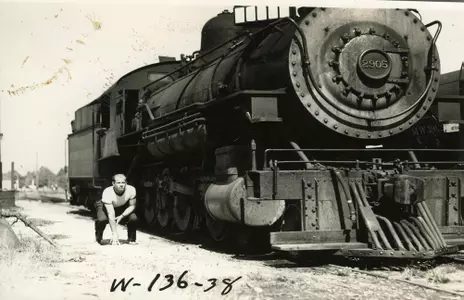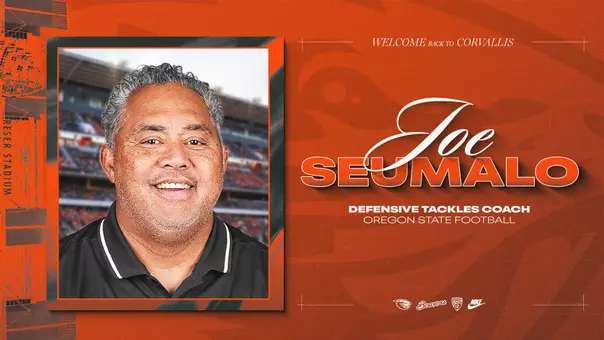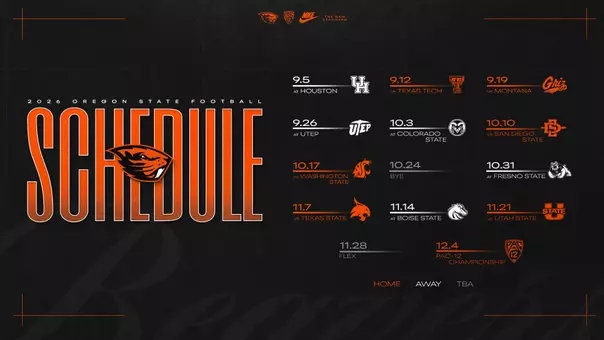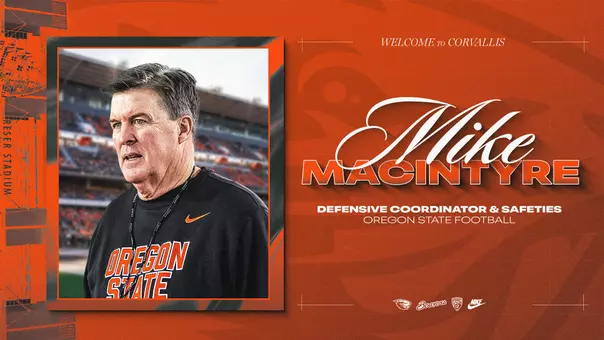
Remembering the Men of Roses -- "How many touchdowns will the Blue Devils win by?"
October 28, 2016 | Football
This is the fifth installment of a seven-part series written by Kip Carlson about the 1941 Oregon State football team that played in the 1942 Rose Bowl. The '42 Rose Bowl is the only one in the history of the storied game that was played outside of Southern California due to fears of an attack on the U.S. West Coast following Pearl Harbor.
This story also appears in the football game-day program Saturday, Oct. 29 vs. Washington State
When Oregon State left the Pacific Northwest bound for the "transplanted" Rose Bowl in December, 1941, it felt like it should be a comparatively smooth trip. After all, the fall and early winter had already had been an up-and-down ride.
Oregon State had been lightly regarded in the preseason, surprised the football pundits with early wins over conference favorites Stanford and Washington, then been upset at Washington State. Next, four straight shutout wins put the Beavers in position to claim their first-ever Rose Bowl bid by beating Oregon, and a come-from-behind 12-7 win in Eugene on November 29 accomplished that.
As was the practice at the time, OSC got to select its opponent and the Beavers wanted the toughest competition they could find. With top-ranked Minnesota unavailable because the Big Ten did not yet allow its teams to play in bowl games, Oregon State selected second-ranked Duke, unbeaten and untied on the season.
All Oregon celebrated the Beavers' accomplishment and was looking forward to the game in Pasadena – until the morning of December 7, when Japan attacked United States military facilities at Pearl Harbor, Hawaii. With the destruction of much of the U.S. Pacific Fleet, the West Coast was thought vulnerable to air attack and military authorities requested the Rose Bowl and Tournament of Roses be cancelled, as they would provide attractive targets.
Oregon State and Rose Bowl officials were disappointed but quickly agreed in the interest of national defense. Just as quickly, Duke offered to host the game on its campus.
So, rather than head for Pasadena on December 19 as had been originally planned, the Beavers boarded a Union Pacific train December 20 bound cross-country for Durham, North Carolina.
As the Oregon State party departed Corvallis, one player was missing: Jack Yoshihara. After the attack on Pearl Harbor, authorities decreed that Americans of Japanese ancestry living on the West Coast would not be allowed to travel more than 35 miles from their homes; rather than go to the Rose Bowl, the sophomore end would spend the holidays at his home in Portland.
Decades later, James Busch, one of his Beaver teammates, would tell the New Orleans Times-Picayune: "Nobody felt that Jack was a subversive threat. He was an American. My heritage was German. Nobody discriminated against me."
The Beavers and Blue Devils would go into the game largely unfamiliar with one another. Duke head coach Wallace Wade had proposed a "no scouting" rule – teams could only obtain information from sources such as newspaper clippings and newsreel highlights, not specialized scouting reports or complete game films – and Stiner agreed; in fact, in his wire to Wade he expressed that a completely non-scouted contest "would have been fun."
After heading east from Portland on December 20, Oregon State's train rolled through Eastern Oregon, giving Beaver fullback Choc Shelton a chance for a quick 6:30 a.m. visit with his father at the La Grande station; the Sheltons were from nearby Union. Later that day, when the train stopped in Grand Island, Nebraska, Oregon State head coach Lon Stiner was able to visit briefly with his father; said Stiner: "We'll win, Dad."
Early December 22, the Beavers arrived in Chicago. They bussed to the Sherman Hotel, then to the University of Chicago's Stagg Field for a workout. As OSC's party drove through the Chicago campus, end George Zellick recognized an address and yelped, "Hold on – that number over there is where my sister lives!" The bus stopped long enough for Zellick to knock on the door and greet his surprised sister.
Oregon State went through a light workout that satisfied Stiner, then it was back to the hotel for lunch. Stiner spoke to a number of reporters whose main question was whether he really thought is team had a chance against mighty Duke, to which Stiner replied in the affirmative. Wrote The Oregonian sports editor L.H. Gregory: "They're interested, but not convinced."
Late that afternoon, the Beavers were back on a Baltimore and Ohio train bound for Washington, D.C. Part of that stop December 23 included a workout at Griffith Stadium, home of baseball's Washington Senators and football's Washington Redskins.
The Beavers also got in some sightseeing, visiting the United States Capitol, George Washington's home at Mount Vernon; Robert E. Lee's home at Arlington, Virginia; Arlington National Cemetery; and the Tomb of the Unknown Soldier.
Observing their stop in the nation's capital, sports columnist Francis E. Stan observed "It seems safe to suggest that as far as the man on the street is concerned Oregon State is a bush team on a coast-to-coast joyride …
"From Head Coach Lon Stiner on down they did their best not to spoil an Easterner's popular impression of a team from Oregon State College along the Willamette River. They rubber-necked at the city from a sight-seeing bus, ate heartily at an evening meal and piled back onto the train for the last lap …
"Somehow, the Beavers didn't behave like a big bowl team. The schools from New York, for instance, put it on big. It's all boom-boom and don't spare the cymbals. The Texas teams take their cues from the chambers of commerce and swagger into town wearing high-heeled boots and wide white sombreros. The California outfits come in style, movie stars hamming things up and press agents beating the big drums.
"The Beavers, though, behaved normally and this was not at all usual."
Oregon State arrived in Durham at 8:15 the morning of December 24 – Christmas Eve. A high school band was on hand and their arrival was broadcast on local radio; Durham Mayor W.F. Carr named Martin Chaves, voted the Beavers' captain for the game, "Mayor For a Day." Wrote Gregory in The Oregonian: "And you should have heard the swell speech of acceptance on Chaves' part – he looked, talked and acted every inch the captain of a winning team."
Thousands of miles away, United States troops were retreating on the Bataan Peninsula before the advance of Japan's military. The day before, the Japanese had landed on Wake Island and forced the surrender of the U.S. garrison there. Football was a diversion, but Americans were more and more turning their attention to the war the nation had entered weeks before.
After breakfast in Durham, the Beavers went to the Carolina Inn on the campus of the University of North Carolina, their training site for the next week. There was a light practice that afternoon, then again Christmas morning.
"Some evidence of homesickness, far from home on Christmas day," Gregory wrote. "But the good people of Duke university, sensing this would be so, come to the rescue with a Christmas dinner for the entire party in the Students Union building at the university, followed by a Christmas tree party …
"Where else but in the south would they do all that for people who have come to beat them?"
That wasn't how the good people of North Carolina viewed the situation. If most of the nation's football fans expected Duke to beat the Beavers – and they did – then folks in and around Durham were certain that would be the case.
Wrote Sid Feder of the Associated Press: "The wizardry of Wade and the way his warriors steam-rollered nine opponents, burying each under a two-touchdown-or-better rockpile, makes Duke the lopsided favorite for this clambake …
"Dixie is casting its vote as a solid bloc for Duke. The boys and girls in this neck of the woods don't want to know who's going to win. All they ask is how many touchdowns you think the Blue Devils, spearheaded by Steve Lash, a power runner tabbed by Wade as the best all-around performer he's ever coached will score."
As the Beavers enjoyed the Southern hospitality, including a trip to Pinehurst Resort that included golf and polo lessons, Stiner continued to tell reporters not to sell the Beavers short.
As reported by the Associated Press' Frank Gilbreth a few days before the game: "'I've heard about Duke's being an odds-on favorite,' Stiner told a bunch of sports writers who had just watched the Beavers look like a million dollars in a practice session. 'And I even read a piece about how all Duke would have to do to win the game was to throw eleven headgears onto the field.
'Well, all I can say is that I'll back a bunch of kids who fought their way up to the top against awful tough competition."
After closed practices during the finish of their week at North Carolina, on December 31 the Beavers held an open workout at Duke Stadium, wearing their game uniforms for the benefit of reporters and photographers who had only recently arrived in Durham.
There was something about the workout Gregory reported to his readers: "I noticed how short the workout was, but didn't realize why until, going back on the bus, (line coach) Jim Dixon said: 'They're right, they're right! They can hardly wait to get on the field! Did you notice how short our workout was? We had to cut it down, or they'd have played their game right then – they were going down faster and further than I've ever seen them do on passes! And say, getting on the bus to come back, every kid was in there impatient to be going – no stringing out, as they usually do."
Back at the Carolina Inn, after dinner, New Year's Eve 1941 saw all the Beavers in bed by 9:30 p.m. The big event was less than 24 hours away.
Introducing Oregon State Head Coach JaMarcus Shephard
Monday, December 01
Oregon State Football Interviews: November 25, 2025
Tuesday, November 25
Oregon State Football Press Conference: Interim Head Coach Robb Akey (Nov. 24, 2025)
Monday, November 24
Oregon State Football Interviews: November 12, 2025
Wednesday, November 12















